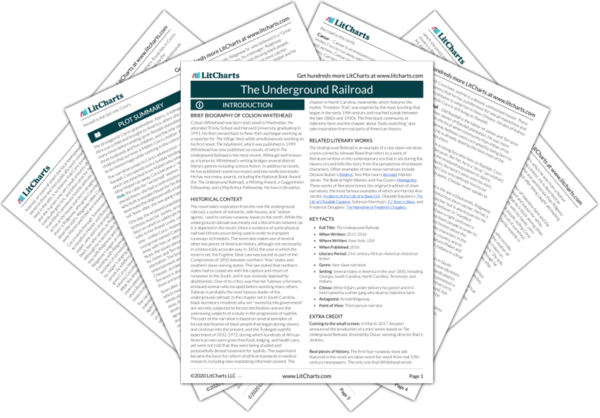When Mabel runs away, Cora becomes a “stray” and is placed in Hob, the cabin for exiled women on Randall. Although the other people living on Randall believe that all Hob women are insane, the only thing that truly unites the women there is their exclusion from the rest of the community. Some have indeed been driven to mental instability by the trauma and violence of slavery, whereas others—like Cora—have simply been labeled as strange and rejected on account of their perceived difference. Being sent to Hob is generally thought of as a curse; many of the residents stay away from Hob women, and there are bizarre rumors spread about them (such as the story that Cora has sex with animals). However, Cora comes to love the other women in Hob and the community they build together. Being labeled insane, in fact, offers a form of protection from violence and hostility. Furthermore, because the decision to run away requires an element of madness, Hob becomes a stepping stone on Cora’s route to freedom. Being cast out of the community allows Cora to dream of casting herself out of Randall and into the terrifying unknown of life on the run. Throughout her journey to freedom, Cora carries the spirit of Hob with her, which encourages her to be brave, rebellious, and fierce.
Hob Quotes in The Underground Railroad
They were exiles, but Hob provided a type of protection once they settled
in. By playing up their strangeness, the way a slave simpered and acted childlike to escape a beating, they evaded the entanglements of the quarter. The walls of Hob made a fortress some nights, rescuing them from the feuds and conspiracies. White men eat you up, but sometimes colored folk eat you up, too.

Unlock explanations and citation info for this and every other The Underground Railroad quote.
Plus so much more...
Get LitCharts A+At the auction block they tallied the souls purchased at each auction, and on the plantations the overseers preserved the names of workers in rows of tight cursive. Every name an asset, breathing capital, profit made flesh. The peculiar institution made Cora into a maker of lists as well. In her inventory of loss people were not reduced to sums but multiplied by their kindnesses. People she had loved, people who had helped her. The Hob women, Lovey, Martin and Ethel, Fletcher. The ones who disappeared: Caesar and Sam and Lumbly.












